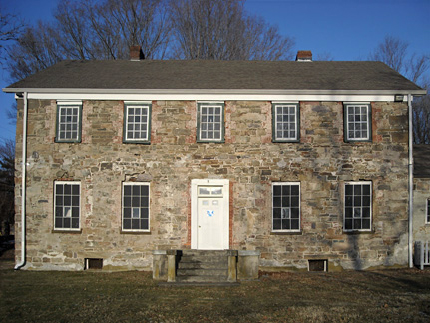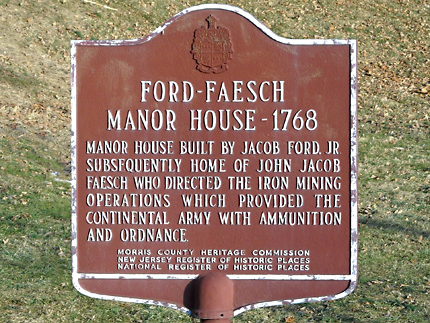



Ford-Faesch Manor House
629 Mt. Hope Rd.
Map / Directions to the Ford-Faesch Manor House
Maintained by
The Historical Society of Rockaway Township
The area of Rockaway Township which is known as Mount Hope was once an iron mining community. Iron was mined and produced here from the early 1700's until the 1970's. During the Revolutionary War, the Mount Hope Iron Works produced supplies and ammunition for the Continental (American) Army.
This building was used as the manor house by men who ran the iron works. It is known as the Ford-Faesch Manor House, and takes its name from two men who were prominent in the iron industry before and during the Revolutionary War - Jacob Ford, Jr. and John Jacob Faesch.
Jacob Ford, Jr., who built this house in 1768, was part of the Ford family who were very prominent in the New Jersey iron business. Ford served as a militia colonel in the Revolutionary War until his death in 1777. His widow Theodosia hosted General George Washington at her home in Morristown during the winter of 1779-1780. [1]
Ford leased the Mount Hope iron works property to John Jacob Faesch in 1772. Faesch was born in Switzerland in 1729, and he immigrated to America circa 1765. He was experienced in the iron industry and had previously run the iron works in Kinnelon. [2]
During the Revolutionary War, the iron works at Mount Hope produced ammunition and supplies for the Continental (American) Army. The production of iron products was so important to the war effort that in 1777 the New Jersey Legislature passed an act to exempt iron workers at Mount Hope from service in the militia. [3]
Earlier that year, thirty Hessian soldiers who were taken prisoners of war at the Battle of Trenton were brought here in March 1777 to work as prisoners of war. [4] Hessians were German mercenary soldiers who fought for the British in the Revolutionary War. The Switzerland-born John Jacob Faesch could speak German, and his ability to easily communicate with the Hessians helped him to utilize his prisoner-of-war workers more efficiently.
Faesch continued to run the Iron Works at Mount Hope after the Revolutionary War ended in 1783, and he would continue to do so for the rest of his life. After playing an important role in the production of military goods during the war, he played an important political role after the war as well. In 1787, he was one of the three delegates from Morris County at the Convention which ratified the United States Constitution for New Jersey. [5]
Faesch died on May 29, 1799, and is buried in the Presbyterian Church cemetery in Morristown. Jacob Ford, Jr., who had died on January 10, 1777, is buried there too. [6]
Some of the land which made up part of the Mount Hope Iron Works is now Mount Hope Historical County Park. The park has remains of iron production, and information signs along the walking paths. For more information see the Morris County Parks website

1. ^ For more information and accompanying source notes about Jacob Ford Jr. and Theodosia Ford, see the Morristown page of this website. Three entries on the Morristown page relate to the Fords:
• The Presbyterian Cemetery, where they are both buried
• Ford Mansion
• The Jacob Ford Jr. Powder Mill Site2. ^ National Register Inventory - Nomination form for the Ford-Faesch House
Available to be read at the National Park Service website here• For more information about the Kinnelon Iron Works, see the Kinnelon page of this website.
3. ^ A Journal of the Proceedings of the Legislative Council of the State of New-Jersey (Burlington, NJ: Isaac Collins, 1777) Pages 116-118
Available to be read at the Internet Archive here4. ^ William Scudder Stryker, The Battles of Trenton and Princeton (Boston and New York: Houghton, Mifflin, and Company, 1898) Pages 215-216
5. ^ Minutes of the Convention of the State of New-Jersey: Holden at Trenton the 11th day of December 1787 (Trenton: Isaac Collins, 1778) Pages 3 and 28
Available to be read at the Internet Archive here6. ^ Gravestones and markers in the Presbyterian Church cemetery in Morristown